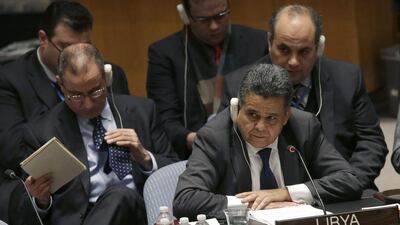UNITED NATIONS // Libya’s foreign minister on Wednesday demanded that the UN Security Council lift an arms embargo so his country can fight ISIL.
Foreign Minister Mohammed Al Dairi spoke to an emergency session of the council amid regional alarm after the extremist group posted a video of the beheadings of 21 Egyptian Coptic Christians in Libya.
Mr Al Dairi stressed that Libya is not asking for international intervention. But he said the international community has a “legal and moral responsibility to lend urgent support” and that the region, including the Mediterranean, is in danger.
“If we fail to have arms provided to us, this can only play into the hands of extremists,” he said. Mr Al Dairi called for the same attention paid to the danger in Libya as has been paid to Iraq and Syria, where a US-led coalition is bombing ISIL targets.
The foreign minister of Egypt, Sameh Shoukry, called for a naval blockade on arms heading to areas of Libya outside the control of “legitimate authorities.” He did not rule out troops on the ground in Libya and said his country was seeking international support “by all means.”
Jordan circulated a draft resolution on the issue to fellow council members late on Wednesday. Aside from the call to lift the arms embargo, the draft resolution also calls on militias to withdraw from Tripoli to allow the return of the “legitimate government,” and it condemns any attempt to supply arms to non-state actors.
Egypt responded strongly to the beheadings, carrying out air strikes against ISIL positions in Libya and saying it was in self-defence. Mr Shoukry has said those air strikes could continue.
Libya is wracked by the worst fighting since Muammar Qaddafi was overthrown in 2011. Two rival governments and parliaments — each backed by different militias — rule in the country’s eastern and western regions. After extremist and tribal militias took over the capital, Tripoli, the elected parliament has been forced to function in the eastern city of Tobruk.
On Tuesday, Egyptian President Abdel-Fattah El Sisi had called on the United Nations to approve a new coalition for air strikes in Libya, where the extremists have set up their first major affiliate outside of Iraq and Syria.
But UN diplomats said Egypt’s initial demands eased during talks later on Tuesday.
*Associated Press

